| کد مقاله | کد نشریه | سال انتشار | مقاله انگلیسی | نسخه تمام متن |
|---|---|---|---|---|
| 943434 | 925469 | 2010 | 6 صفحه PDF | دانلود رایگان |

The theory of biological markets and competitive altruism contends that competitive partner selection is favorable to the selection of prosocial behaviors in social evolution. The current study provides an empirical assessment of this theory based on a laboratory experiment with human subjects using the Ultimatum game. The experimental results show that more generous proposers and more tolerant responders are preferred as partners. This indicates that subjects tend to choose partners in a manner that coincides with their own interests. In competitive partner selection, partner preferences driven by self-interest nevertheless generate an assortative pairing structure that prompts players to behave fairly in the game. The study shows that a free market of partner selection, plus the type of partner preferences driven by self-interests, can facilitate the emergence of fairness in social exchange.
Journal: Evolution and Human Behavior - Volume 31, Issue 4, July 2010, Pages 265–270